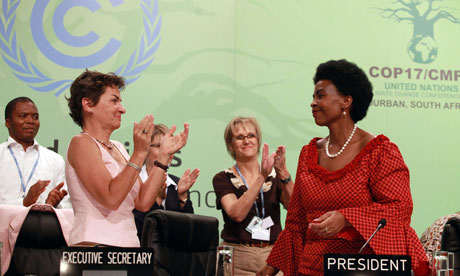Scientists and environmental groups warned that urgent action was still needed to rescue the world from climate change, despite the deal sealed on Sunday morning in Durban after two weeks of talks.
Andy Atkins, executive director of Friends of the Earth, said: "This empty shell of a plan leaves the planet hurtling towards catastrophic climate change. If Durban is to be a historic stepping stone towards success the world must urgently agree ambitious targets to slash emissions." Although governments managed to find a last-minute deal that should lead to the first legally binding global agreement on climate change covering developed and developing countries, they did not discuss whether their pledges to cut emissions would prevent dangerous levels of global warming.
Under the Durban agreement, governments will now spend four years negotiating how far and how fast each country should cut carbon emissions.
Atkins said the science was clear – the current emissions targets set by developed and developing countries were inadequate, and if they were not strengthened, the poorest would be hurt most. "Millions of the poorest people around the globe are already facing the impacts of climate change – countries like the US who have done most to create this crisis must now take the lead in tackling it," he said.
Other environmental groups and scientists agreed.
"What is positive in Durban is that governments have reopened the door to a legally binding global agreement involving the world's major emitters, a door which many thought had been shut at the Copenhagen conference in 2009," said Bill Hare, director at Climate Action Tracker.
"What remains to be done is to take more ambitious actions to reduce emissions, and until this is done we are still headed to over 3C warming. There are still no new pledges on the table and the process agreed in Durban towards raising the ambition and increasing emission reductions is uncertain in its outcome."
Bob Ward of the Grantham Institute at the London School of Economics said the current pledges from countries to cut their greenhouse gas emissions were not enough to hold global temperatures to 2C above pre-industrial levels, beyond which scientists say climate change becomes catastrophic and irreversible.
He said that, according to the United Nations environment programme, countries' current emissions pledges would collectively mean that global annual emissions of greenhouse gases would be about 50bn tonnes in 2020, similar to the total in 2011.
But to have a 50-50 chance of avoiding global warming over 2C, scientists estimate that global annual emissions would need to fall to about 44bn tonnes in 2020, to less than 35bn tonnes in 2030 and less than 20bn tonnes in 2050.
Ward said: "[That means the current] pledges for emissions reductions are not consistent with the two degrees target, although they would, if delivered, move us halfway between 'business as usual' and the path on which we would need to be in 2020."
Several participants in the talks said current pledges had been covered at last year's conference in Cancún where countries confirmed their emissions targets. Instead, this year was about diplomacy: chiefly, the issue of whether countries should be bound to cut emissions through an international treaty, or should make voluntary pledges. The question has dogged the talks for over a decade.
At the climate summit in Copenhagen in 2009, nations failed to write a treaty though they did sign up to a lesser form of agreement, in which the world's biggest emitters – developed and developing – set out targets to curb their carbon by 2020.
However, the targets that have been set will be subject to review from 2013-15 to decide whether they should be toughened, especially in the light of a scientific report from the Intergovernmental Panel on Climate Change due out in 2014. The climate change secretary, Chris Huhne, said: "The direction of travel is clear – the targets can only be strengthened. The scientific evidence is growing clearer."
For some, including the US and China, this "pledge and review" process of voluntary pledges offers an adequate way of ensuring carbon is reduced globally. But for others, including the EU and many developing countries, it is inferior to a legally binding international treaty, because the voluntary process is too prone to politicians reneging on their commitments.
Brazil's chief negotiator, ambassador Luiz Alberto Figueiredo, said: "This is a landmark achievement that creates real possibilities for scaling up the fight against climate change. It's an excellent text that clearly sets points of action, points of commitment, and timetables, and it is legally-binding, so it is extremely effective, potentially, for responding to the need of climate change. We got what we came to Durban to get.''
In return for the Durban agreement, the EU conceded to developing country demands to continue the Kyoto protocol after its current emission-cutting targets expire next year.
The EU is the only major developed country bloc to agree to a continuation. Japan, Canada and Russia have all refused, and the US has never ratified the pact.

